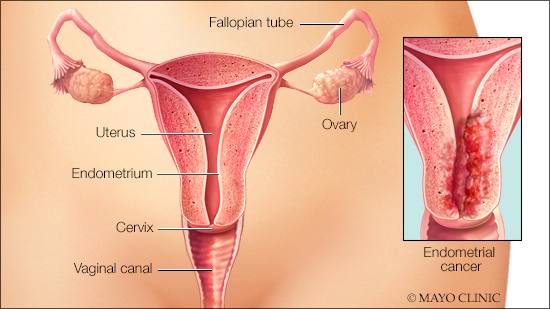-
Cancer
Mayo Clinic Q&A podcast: Why are more people dying of uterine cancer?

The number of people who die from uterine cancer is increasing, particularly among Black women.
Also called endometrial cancer, uterine cancer begins in the layer of cells that form the lining, or endometrium, of the uterus. The American Cancer Society estimates that about 65,950 new cases of uterine cancer will be diagnosed in the U.S.this year, and about 12,550 people will die from the disease.
Researchers recently reported that while death rates for the most common type of uterine cancer — endometrioid cancer — remained stable, deaths from rare and aggressive types of uterine cancer increased significantly each year from 2010 to 2017.
"We do see a rise in diagnosis of uterine cancer," says Dr. Kristina Butler, a Mayo Clinic gynecologic oncologist. "And we feel like that is because there's also a rise of some other illnesses such as diabetes, hypertension and obesity, which are risk factors for uterine cancer. And because we're seeing more people experience those types of illnesses, uterine cancer rates are rising."
The study also revealed a disproportionate increase in uterine cancer deaths among the Hispanic, Black and Asian community. Death rates from uterine cancer increased 6.7% annually among Hispanic women, 3.5% among Black women, 3.4% among Asian women and 1.5% among White women. Despite representing less than 10% of cases, nearly 18% of all deaths from uterine cancer occurred in Black women.
"Addressing health disparities is a huge priority of our national organization, the Society of Gynecologic Oncology," explains Dr. Butler. "I think it's very clear that there are disparities as it relates to patient access to care. Also, opportunities to train providers in cultural competency, so that patients feel very comfortable coming and having that patient-doctor relationship. And we need to improve health care access for women in rural communities and take education to those communities so that those women feel comfortable reaching out to us when they need care."
On this Mayo Clinic Q&A podcast, Dr. Butler discusses uterine cancer, disparities related to the disease, and what people can do to reduce their risk of developing this type of cancer.
Watch: Dr. Butler discusses endometrial cancer.
For the safety of its patients, staff and visitors, Mayo Clinic has strict masking policies in place. Anyone shown without a mask was either recorded prior to COVID-19 or recorded in a nonpatient care area where social distancing and other safety protocols were followed.







